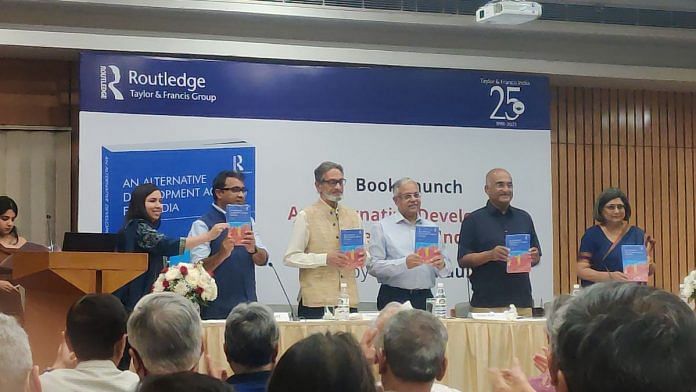Pronab Sen, Planning Commission’s former economic advisor, saw the title of Sanjay Kaul’s book—An Alternative Development Agenda for India—as not just a direct challenge but an affront.
“Because when he talks about an alternative development agenda, alternative to what? Alternative to what I had been doing for 15 years?” he said at the launch of the book on 9 April in New Delhi’s India International Centre (IIC). While Kaul looked like he was almost expecting this, the crowd burst into laughter.
But soon, Sen also praised the book for its diversity, different perspective and academic approach. The only way to read the book, he suggested, is to examine it as India’s plan for the next decade.
Anyone who has read the Routledge India book might not disagree with Sen. The book by Kaul, an IAS officer-turned-corporate leader and a development policy analyst, is a set of academic research papers. Each chapter has 50-60 references at the end, which include government surveys, independent papers, articles, and books.
The author readily talked about the amount of work he put into the book. And the audience seemingly took note of it. “It is an expensive book!” said someone in the audience after the book launch. The person sitting next answered, “Yes! But it seems that a lot has gone into it.”
Also read: Serving, ex-officers spar over democracy & governance at event, Amitabh Kant defends G20 spending
Poor, tribal family of Birsa and Rasika
In the book, Kaul connects story-telling, academic work and his experience in government service and the corporate world. He mentions seven areas—health, education, food and nutrition, child development, jobs, gender and urbanisation. There is almost a set pattern of diagnoses and suggested solutions in each chapter.
However, what makes the book different from other academic works are its fictional characters—Birsa and Rasika. Theirs is a poor tribal family from the deep rural interiors of India. Kaul repeatedly uses their examples to better demonstrate the impact of poverty. In almost all the chapters he says, “Let’s turn to the story of Birsa and Rasika.”
“For example, as life can be pretty dull in a village, it is easy to see why a poor person like Birsa may prefer to spend on a TV or a cell phone rather than more food. This behaviour may explain why food spending has not been going up in lower-income households,” Kaul writes after explaining how hunger and poverty are incorrectly assumed to always go hand in hand.
Also read: Siren on, TVs off. This Maharashtra village is on ‘digital detox’ to produce IAS, IPS officers
Govt needs to be open to ideas
Before Kaul came to speak during the launch, there was a sense of celebration in the air. Everyone greeted each other with a smile and some chatter.
But the jam-packed hall at the IIC turned tense as soon as Kaul started throwing facts, ones that make one wonder about the country’s development to date.
“I have tried to view these issues from the view of a typical impoverished family,” he said. “Birsa and Rasika are caught in a vicious poverty trap, as they continuously borrow money as they move from one crisis to another. Despite the best government strategies, they will always remain weak.”
Since the liberalisation, reasonable economic growth has been made, claimed Kaul. Yet, India is one of the most unequal societies. The already low levels of employment are further declining, human development indicators in health, nutrition and education have improved but altogether they do not tell a flattering story. A significant population resides in towns and cities in ‘uninhabitable conditions’. It is in this context that the book offers a “feasible alternative development agenda”, which Sanjay Kaul called the “People First Imperative”.
“For God’s sake, if you are going to lead the country, read this and maybe you’ll understand what you are going to do,” Sen said, addressing India’s political class.
Vrinda Swarup, former education and food secretary, also joined in. “Governments must be open to ideas, partnership and policy,” she said. As an example, she mentioned that foundational learning—“a prime need”—took an immense amount of lobbying from civil groups for it to be included in the new National Education Policy (NEP) after a long time.
For Kaul as well, the political class is a target group. “Ahead of the 2024 elections,” he said, “I hope this book triggers healthy discussion and debate on these issues. I would indeed be very pleased if even a few of the book’s proposals find a place in the election manifestos of political parties or policy in their document.”
(Edited by Ratan Priya)



